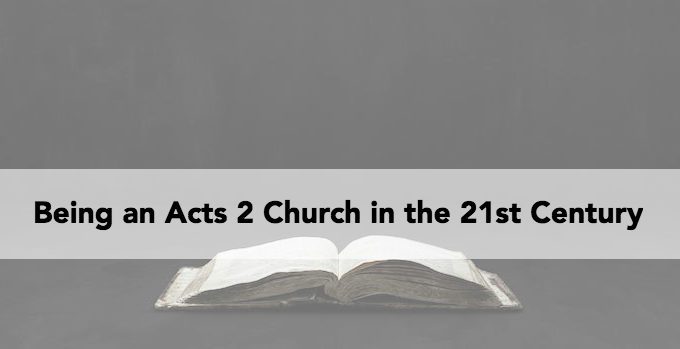
The very early church – possibly before they got to call themselves church*1 – had some really relevant ways to connect with each other.
This is my paraphrase of Acts 2:42-47:
“They read lots of stuff online and met often for coffee, for Communion and for prayers. It was just amazing at what they could see/find/know about God. Everyone looked after each other – it was ‘we’ not ‘me’. If any had a need, it was dealt with immediately. So they met up often, in church, in cafes, at home, and really enjoyed what they had to eat. People could see what was different, and people explored that ‘what was different’ day by day”

Looking at each verse there does seem to be some connection with today:
Verse 42 : Following on from the Emmaus Road experience from last week, note that it is in the breaking of the bread – what we call Communion today – that was the key moment, that moment when sharing was occurring.
Verse 44: Everyone had things in common – as we do now – how is the lockdown going? Can you find yeast anywhere?
Verse 45: They sold goods, distributed stuff, as any had need. We have seen such generosity with the Tod Squad and the Kindness Corner in Todmorden. Furthermore, ‘if they do the Father’s will‘, let us not concern ourselves that they may not represent church, they are doing God’s work. Generosity can be seen in meals, so…
Verse 46: They savoured their food, especially the pasta, flour and toilet rolls they had struggled to obtain earlier.

Verse 47: and people came to try to understand why they believed. Some have said that God is stirring people up currently, and they will return to Church post the pandemic.
But, I would question this perspective. If people can discern a need for God at a time of real crisis, then do they need God when they are not in crisis?
Is God just a crutch in our time of crisis?
If God isn’t needed outside of a time of crisis then our understanding of God isn’t much in normal times.
So how do we convey our understanding of God in those ‘normal’ times…that people can understand the wonder of God, the joy of knowing God – more than the words in Scripture, but really day-by-day, in the ups and the downs of life – when there isn’t a crisis?

How will we come out of this, showing what is critical in our lives? Is it the material goods or relationships, how we connect with others and God?
Personally, I have found God to be present in the every day issues of life, not just in those times of joy but in those times of real sadness, of heartache. God can be praised for those times when all has gone well, and but also one to cry out to, shout at, speak to, be silent with.
Once when going to Ilkley Methodist Church and finding myself on my own, I began to shout at God, “where are you when I needed you?“. I begun to feel so close again to God – but also realised that I was on CCTV…
Recently I met up with one chap, who lived high above Cornholme, north of Todmorden, remote and cut off. Standing our 6 foot apart, we stood looking out over the views of the hills of West Yorkshire. And we shared our understanding of God’s creation. For some moments there was silence, because often words can’t express that beauty – also an opportunity to hear the birdsong. It was good to share.
What can be seen in so much abundance in our lives, our everyday lives, that others might wish to ask: “why? what is that difference?” that we can so share abundantly?
Is it just a personal faith for those times of crisis – or for everyday, so good we wish to share it?
*1 Ekklesia or Church was first mentioned in Matthew written around 70 BCE, whereas Acts was written around 60 BCE
Goodness Bob, this throws up a lot of questions! ‘Needing’ God? Many people live functionally without acknowledging the divine, but if as we believe ‘God’ is an ultimate – THE ultimate truth – then I assume that we would all live fuller, more fulfilled lives if we consciously lived within that truth. For me, it’s about finding a deeper connection with the eternal presence, god with us, rather than God as an external agency that ‘does things’ to us
I think ‘needing’ God refers to the possible perspective of people ‘crying’ out to God during a crisis. This is often cited in the Exile etc. However, my point was really about this dichotomy that churches may perceive that ‘people could flock back to the Church’ post the release of lockdown, because of this crisis; so my question was what of that desire pre-lockdown i.e. in ‘normal’ circumstances? Your point highlights a consideration that faith is about walking with God, as you say ‘connection with the eternal presence’; whereas, our prayers in services are often a ‘shopping list’ for God to action. I agree with you.